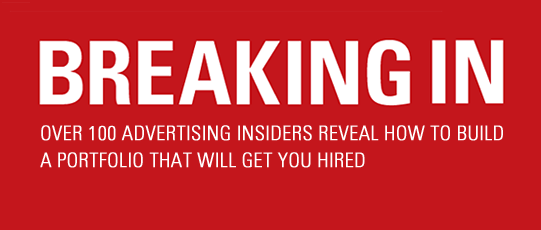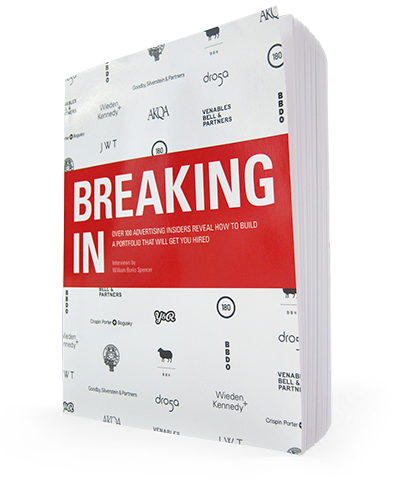If you missed it, check out some great work from Michael Lebowitz and Big Spaceship.
WS: You mentioned finish. Are ideas more important or is finish more important or does it depend on the job?
ML: Ideas are really important, but the way that the traditional side of the business values “the big idea” is completely out of balance with the way that you actually produce work in the digital space. I say all the time, “The greatest idea in the world, unproduced, has no value whatsoever. A mediocre idea, produced, has some incremental value.” So why is the value always placed on the big idea when getting things into the world is so important? The difference in thinking makes a ton of sense because, when you have to spend a tremendous amount of money to put it out into the world, because there are limited places to put it, you would have to have a huge idea, polish it for however long, and make sure it’s absolutely perfect for one big blockbuster release. But in digital, we publish whenever we want, we republish and iterate whenever we want, and it doesn’t cost much, or anything, to do the actual iteration in publishing. So the mindsets are so, so different.
WS: Do you hire some more “idea people” or does everyone have to have ideas and skill to make it?
ML: Well, I think everybody contributes in our brainstorming sessions, whether for a pitch or a new challenge from an existing client, across all of our disciplines. It’s not like strategy comes in and defines everything up front. Everybody is involved end to end. We’ve had amazing ideas that have been sold to clients that have come from developers, designers, from interns across all of our different disciplines. Great ideas come from everywhere, and a lot of times, if you’re open to it, a lot of great ideas come from terrible ideas. Somebody says something just because they feel safe enough in their environment to throw something out that they know is crap. And somebody else grabs it, and levels it up somehow, or turns it into something really interesting, or attaches an insight to it that actually makes it relevant. So I think basically, everybody is an idea person and, again, I know that there is sort of this Hollywood-style auteur thing going on on the other side of the fence [traditional agencies]. Maybe I’m naïve but we don’t believe in rock stars. It’s about the team. Everybody here makes each other better and it’s that way of working that makes our work good. And it’s all the same people who are executing that are also coming up with the ideas for it. With traditional agencies the process is always pretty linear: “We’re going to come up with the big idea and polish that idea, then we’ll bring it to the production company and they’ll level it up as well, but only focus on craft and final execution.” And we’re letting that happen in a much more cyclical, iterative way, all the way through. Even before we’ve actually produced anything tangible, anything crafted I should say, the people who are traditionally considered “executional” are in the process of crafting ideas and it works really well for us.
WS: For writers, do you get people from ad schools and people that bring in print ads? And in writers what do you look for? How would you demonstrate your ability to write?
ML: Fundamentally, if you don’t have a blog then I wonder if you have something to say and I sort of feel like writers should have something to say. If you’re only going to be able to say other people’s messages then are you going to really have some sort of guts behind it? Not that it’s an absolute “no” if someone doesn’t. But it’s a question mark. I certainly don’t mind looking at print ads, but you know, with static copy, the whole mind-set and strategy behind print is that you have to capture everything in one moment. And so it’s branding and everything gets sort of mashed into a single space. And there’s no sense of evolution or process or user experience.
And also technical considerations like writing for SEO [search engine optimization]. As much as there is that, “I want my craft to be pure” mentality—and fair enough, frankly—if you want to be seen in a world where you have to earn people’s attention, then you have to be able to write to get it. That, when taken too far, is a great race to the bottom, and you see that with a lot of really salacious headlines and the top-ten list of every publication online, and stuff like that.
But I think we look for flexibility—tonal flexibility. We’ll do work for a Hollywood-featured film, and then we’re doing consumer health-related stuff for GE, and then we’re doing all of our work for Wrigley. And with our writers, we don’t sit people on an account. People move around and do a whole bunch of different things for the most part. So you have to really be able to leap in and out, and not just tonally, but also in the form of delivery. So we’re composing blog posts for some of our clients, we’re writing tweets for some of our clients, we spend a lot of our time writing about ourselves, like, “What are the case studies?” and, “What’s the tone of voice that we want our brand to carry out into the world?” Because that affects what business we get and how the business that we do get and execute on gets celebrated.
WS: So, ideally, would you like to see someone who has their own online presence—they blog or they have a personal website that’s really cool—and they do all these things for themselves, and also they have a portfolio site where they have done great work on the web, that’s either spec work or for clients?
ML: Ideally, yeah. Again, it’s about process. I want to understand why. I think when I look at a traditional book, I think, “Well that’s a clever tagline or that’s a good gag.” That has no relevance to me whatsoever. “Okay that’s clever. That’s pretty funny.” But how did you get there? Why is that what it is? Clearly, these things need to be based on insights. Was the insight theirs or did they get it from a planner? And if it came from a planner, then at least show me the process of how you translated the insight, which is abstract, into something a human can actually interact with?
WS: Do a couple sentences of setup—a paragraph—help you to do that?
ML: Yeah. Anything about process helps. I want to know how people think. And it’s not that the finished execution isn’t important, it’s just equally important to understand the “why” and the “how.” And certainly, if what you have is 20 print ads, spec or otherwise, even if you’re a great writer, it’s really hard to see what space you would fill here. That’s where blogging and other stuff can start to fill in some of those gaps, because a lot of schools don’t really give a lot of opportunities for anything but print ads still. But I think it’s this funny thing. We’re launching all sorts of software applications, basically. Yes, some things are campaign oriented, but we’re launching iPhone apps, just as an example. That’s not traditional copywriting. It’s writing about software which means explaining functionality and getting what can be fairly complex functionality distilled down to a couple of bullets because that’s all you get before you have to hit the “more” button in the App Store in iTunes. And how do you orient people? How should you create a desire for that functionality? But then how do you actually explain how to do it in tiny, little bits of language? So it’s a combination of technical writing, copywriting, there’s long form and short form, there’s tweets. I mean, it’s so amazing, the ecosystem of types of writing. If I finally see one [type of writing skill], I’m always going to ask myself the question, “Is there room for the others in this person?”
WS: If someone were interested in online and traditional, is there anything that you would say to help them decide which way to go? Because, to a large extent, both digital agencies and traditional agencies are doing more and more of the same thing.
ML: Yeah. Well, it seems that way and I always question whether they actually are. I think the value of this place is the people here are challenged—really, really challenged—every day. And not just like, “Here’s a new complicated brand that you have to figure out how to articulate.” That’s one vector of challenge but there’s another challenge of, “Okay, for this one, we’re going to create a completely different kind of system that’s totally elastic and it’s going to interact differently for every single person that interacts with it. So, we have to build a system of language that is adaptable enough, that it will still make sense regardless of the use-case.” And then, that will be a challenge, and you’ll have to sort that one out and then you’ll have to move on to another one. And it’s much more fragmented in a way, and it’s much more around “systems thinking.”
So if you want to craft perfect lines of copy, more power to you, but that’s not really a full-time job here. I’m sure at other, more advertising-oriented digital agencies it could be. I can only speak for us and I have found out more and more that we’re kind of a unique animal. But I think if you want to have finished, crafted things, artifacts you’ve sent out into the world, you’re going to get a lot more satisfaction out of the traditional side. Maybe. Maybe you will. We do send artifacts out into the world but they’re hard to clearly quantify or articulate. Or harder, certainly, than, “Here’s a print ad I did.” So I guess it’s sort of what you want out of your career. I say, more important than anything, is, “have a place where you love to go to work every day.” It’s the most important thing. When I was talking to VCU [Brandcenter] students I told them, “Interview these people.” You could be going for an internship: you’re interviewing them. This is about your day-to-day happiness. You spend a third of your life sleeping, so have a great mattress. You spend at least a third of your life at work. Have a place that’s going to make you feel good. Not that it will be stress-free, you’re in the wrong industry for stress-free, but that’s more important I think than any type of output. Are you going to learn every day? Are you going to feel challenged every day? Are you going to get the personal satisfaction you’re looking for, and then you can work backwards from there into the type of work…


Comments are closed.